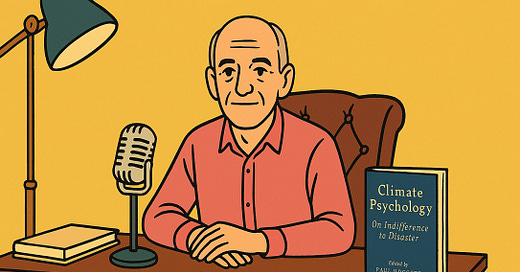Paul Hoggett is Emeritus Professor of Social Policy at the University of the West of England, as well as an active psychotherapist and co-founder of the Climate Psychology Alliance. Author of "Paradise Lost," Hoggett has been a pioneering figure in the development of psychosocial studies in UK universities. His notable works include "Politics, Identity and Emotion," a landmark contribution to the field. Alongside his academic career, he continues to practice as a psychotherapist in Bristol.
Episode Summary
In this episode, we engaged in a profound conversation with Paul Hoggett about psychological responses to the climate crisis, the relationship between humans and nature, and their political implications. Hoggett analyzed three fundamental psychological reactions people have when confronting the reality of climate change: denial, disavowal, and nihilism.
We discussed the central thesis of Hoggett's book "Paradise Lost," which examines modern civilization's separation from nature and the three fundamental disconnections this has created:
Human separation from nature
Human alienation from our own mortal, creaturely nature
Human disconnection from one another
Our conversation also addressed the emotional challenges faced by climate activists, the role of national versus global strategies, the issue of climate refugees, and the connections between climate change and inequality.
This episode offers a valuable perspective for understanding the psychological dimensions of the climate crisis and confronting the defense mechanisms we develop in response to it. Hoggett's analysis helps us understand not only environmental issues but also today's political polarization and social fragmentation.
Paul Hoggett's book "Paradise Lost" serves as an important resource for those seeking to understand human psychology in the face of the climate crisis.
Takeaways
The climate crisis evokes strong emotional responses.
Disavowal is a common psychological defense mechanism.
Nihilism is emerging as a response to climate despair.
Trust in experts is often overshadowed by personal experience.
Denial and disavowal are distinct but related concepts.
The climate movement must engage with emotional realities.
Recognition and respect are crucial in climate discussions.
Class dynamics influence authority and trust in climate discourse.
National politics may offer more effective climate action than global efforts.
The intersection of climate change and immigration is a pressing issue.
Chapters
00:00 Introduction and Technical Setup
00:22 Paul Hoggett: Academic Background and Climate Psychology
04:00 Disavowal and Nihilism in Climate Response
04:39 Understanding Denial: Soft vs. Hard Denial
07:05 The Role of Psychoanalysis in Climate Awareness
09:46 The Psychological Impact of Climate Activism
12:28 The Apocalyptic Imagination and Climate Activism
14:46 Paradise Lost: Core Themes and Psychological Insights
28:58 The Beauty and Wonder of Nature
29:09 Theological Perspectives on Nature
29:56 Human Relationship with Nature
31:47 Psychoanalytic Insights into Climate Crisis
33:49 The Role of Evidence in Climate Psychology
35:31 Authority and Democracy in Climate Issues
40:59 Trust in Experts and Institutions
43:29 Recognition and Respect in Climate Activism
46:37 National vs. Global Strategies for Climate Action
50:13 Class and Authority in Climate Discourse
56:14 Climate Refugees and Political Implications
01:00:18 Concluding Thoughts on Climate and Society
Keywords:
climate crisis, Paul Hoggett, disavowal, denial, nihilism, climate psychology, authority, democracy, emotional responses, environmental movement







Share this post